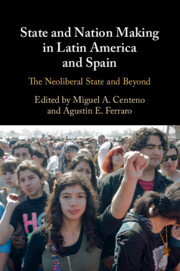Book contents
- State and Nation Making in Latin America and Spain
- State and Nation Making in Latin America and Spain
- Copyright page
- Dedication
- Contents
- Notes on Contributors
- Preface
- Part I Introduction
- Part II Economic and Territorial Power
- Part III Infrastructural Power: Reform Strategies
- Part IV Symbolic Power: Identities and Social Protest
- 11 Women Are the Social Face of the State
- 12 Europeanization Effects
- 13 Redefining Labor Organizing
- 14 Locating Neoliberalism in Abiayala
- 15 Resisting Neoliberalism? Territorial Autonomy Movements in the Iberian World
- Part V Conclusions
- Index
- References
12 - Europeanization Effects
Statehood and Contentious Politics in Spanish Democracy
from Part IV - Symbolic Power: Identities and Social Protest
Published online by Cambridge University Press: 03 August 2023
- State and Nation Making in Latin America and Spain
- State and Nation Making in Latin America and Spain
- Copyright page
- Dedication
- Contents
- Notes on Contributors
- Preface
- Part I Introduction
- Part II Economic and Territorial Power
- Part III Infrastructural Power: Reform Strategies
- Part IV Symbolic Power: Identities and Social Protest
- 11 Women Are the Social Face of the State
- 12 Europeanization Effects
- 13 Redefining Labor Organizing
- 14 Locating Neoliberalism in Abiayala
- 15 Resisting Neoliberalism? Territorial Autonomy Movements in the Iberian World
- Part V Conclusions
- Index
- References
Summary
Whereas dominant explanations argue that neoliberalism has caused a reorientation of social protests from the nation-state toward policies that emanate from international institutions, the political protests in Spain after 2011 do not correspond to this description. Rather than addressing the European Union, Spanish protesters called the Spanish state of democracy into question. In order to understand the impact of neoliberalism on social protest in Spain, it is crucial to consider its historical entry through the Europeanization of Spanish politics. The Spanish government’s adoption of neoliberal policies during the preparation for EC membership has transformed, not weakened, the state by developing independent decision-making procedures. Consequently, former ties between political elites and civil society actors were destroyed. This created widespread political disenchantment but also resources for ideological and social mobilization that remained unallocated until various newly formed societal groups started to frame the crisis after 2008 as a confrontation between elites and ordinary citizen. The initial success as well as the subsequent difficulties of the new Podemos party reflect a Europeanisation of Spanish politics that has made earlier forms of integrating social protest into political decision-making processes impossible.
- Type
- Chapter
- Information
- State and Nation Making in Latin America and SpainThe Neoliberal State and Beyond, pp. 382 - 410Publisher: Cambridge University PressPrint publication year: 2023

